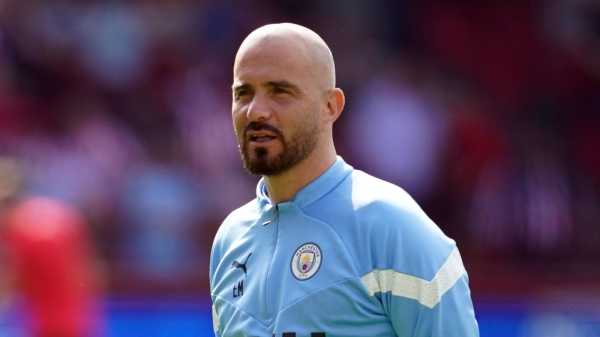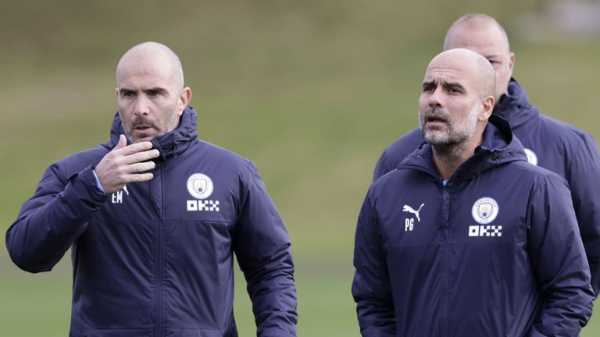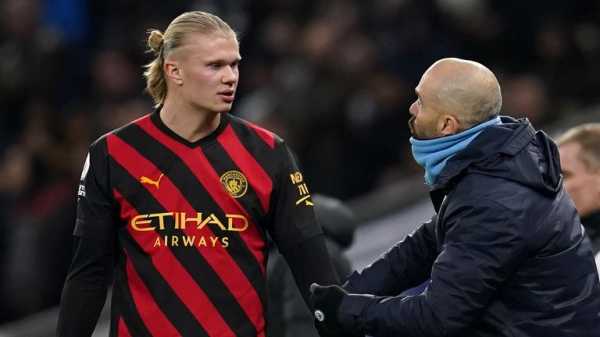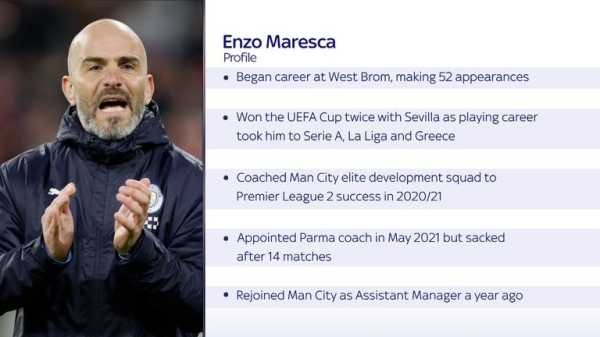
If a man is to be judged by the company that he keeps then it is no surprise Enzo Maresca is in demand. The assistant manager to Pep Guardiola also boasts a 30-year friendship with Roberto De Zerbi. He could learn more than most by accident.
But Maresca’s knowledge of the game owes less to osmosis and more to a career spent at the top of the game. The former Juventus and Sevilla midfielder has been honing his coaching craft in Italy, Spain and England, growing his reputation.
De Zerbi has said that they share “similar ideas about how the game should be played” and Guardiola was impressed enough by his work with Manchester City’s development team to bring him back to the club as his assistant when Juanma Lillo departed.

A look at Manchester City assistant Enzo Maresca
In winning the title with that U23 side, Maresca’s work had caught the eye, according to Ceri Bowley, City’s former head of coaching support. “He had a good group but you could see his impact in how they played and how they kicked on,” Bowley tells Sky Sports.
“I was always impressed. He is really humble guy. If he was not then Pep would not have had him. He has a very clear identity in terms of how he wants his team to play and is very good in how he communicates that to players. Really clear, really simple.”
Trending
- Transfer Centre LIVE! Zaha, Rice, Palhinha latest
- Man Utd unlikely to go for Kane | Contacts made about Hojlund
- Man Utd to make formal bid for Mount | Long-standing interest in Caicedo
- The agony of Deportivo La Coruna continues
- Papers: PSG make contact with Zaha
- Ferdinand felt ‘physically sick’ after racist gestures at Molineux
- Man Utd transfers: Maguire exit ramped up amid Kim interest
- FREE STREAM: The Transfer Show LIVE!
- Arsenal transfers: Gunners to continue Rice pursuit
- Mayweather exhibition fight vs Gotti descends into mass brawl
- Video
- Latest News
Maresca had been “next on the list” for the assistant role when it went to Lillo in the first place, only missing out because of the Spaniard’s longstanding relationship with Guardiola. The U23 role was an opportunity to prove that he would be an ideal fit.
His support role in City’s treble win vindicates the belief in a coach who once had lifts to training from team-mate Graham Potter when he was a teenager at West Brom. Now, Maresca may become just the latest Guardiola apprentice to move on.
Also See:
Mikel Arteta, of course, has already shown his worth at Arsenal. Former Guardiola captains Xavi Hernandez and Vincent Kompany won their respective leagues this season. “When you work with Pep, you are going to get opportunities,” says Bowley.
And yet, this is not just a Guardiola coaching school emerging. It is a City one. As Bowley explains, that was always the idea when Brian Marwood, now manager director of global football at City Football Group (CFG), began to put the building blocks in place.
“When I first started working at City Football Group, this is something that I discussed with Brian a lot. The world of football had this heavy Barcelona influence at the time. Every coach seemed to want to be associated with their way of playing football.
“I think it started to happen again with Red Bull. People like Marco Rose and Jesse Marsch came from that Red Bull model that was established by Ralf Rangnick and that had a big influence on the game around the time that Liverpool won the Premier League.
“The way I would describe that, without being disrespectful, is that they disrupted the game. That is what Jurgen Klopp did. He disrupted everything that City did and it was successful for a period. It made Pep have to think again in terms of how he evolved.
“But where I think the game has shifted, definitely in the Premier League, is that teams need control. The misconception with our City methodology was that it was about possession. Our whole focus was on control not just possession. That is why you are seeing now.
“Teams are realising that it is very difficult to be successful with a model that is built around counterattack. You have to be able to control the ball to control the game, so there is this real appetite around the game for the coaches from City Football Group.”

Image: Enzo Maresca returned to Manchester City last summer
The appeal of success is nothing new, but what has changed is that the multi-club structure is providing a level of access for young coaches that cannot be replicated outside of the group. Maresca is not just Guardiola’s assistant, he is part of a coaching cohort.
“The beauty of it is that there is so much knowledge transfer. The challenges at New York might be experienced at Melbourne in six months. We based a lot of what we did at Girona on New York and Melbourne. We encouraged the coaches to share ideas.”
Clubs in City Football Group
- Manchester City
- New York City
- Melbourne City
- Yokohama F. Marinos
- Montevideo City Torque
- Girona FC
- Sichuan Jiuniu
- Mumbai City
- Lommel SK
- Troyes
- Palermo
- Bahia
Des Buckingham has just topped the table with Mumbai City having previously worked within CFG at Melbourne City. “It is not a prescribed document that you are given saying this is how you must do things, but you have regular support,” he tells Sky Sports.
“It is not people phoning you up saying you must do this, they are suggestions because they watch your matches, they watch your training sessions, which are all uploaded. The feedback helps to ensure that the principles of play are similar.”
He adds: “The beauty of it is that we can connect with the other coaches.” Mumbai have regular dialogue with Lommel in Belgium, for example. “We have a good relationship. You can bounce ideas off. You do not have that access outside of the group.”
That is the challenge for clubs hoping to poach CFG coaches in the belief that the success can be easily replicated elsewhere. In the short period between being City’s U23 coach and their first-team assistant, Maresca was hired and fired by Serie B club Parma.

“It was not because of him,” says Marco DeMicheli, Sky’s reporter in Italy. “The problem at Parma is that they had been relegated and there had been a change of ownership because an American businessman had bought the team. There were a lot of problems, many players coming and going from abroad. It was such a mess.”
Maresca lasted just 14 games.
“He tried to play the City game with a very attacking lineup, using 4-2-3-1 or 4-3-3, but it was a very difficult situation at Parma. Those problems continued even after Maresca left. The problems were still there. They just lost the playoffs this season too.”
Behind the scenes, he had impressed.
“Even at Parma, where things did not go well, when people talk about Maresca, they talk well about him. He was a really good manager and person. They could see he had something different. He had some particular ideas about attacking football.
“One thing that impressed me was that during the same training session he was able to speak multiple languages at the same time. For example, he spoke English, Italian and Spanish. He also spoke some words of Greek with the Greek player he had there.
“He was very kind to everybody, helpful to young players. He had Gianluigi Buffon, his former team-mate, there too. He spoke to him a lot because it was his first experience as a manager and he was trying to get all the help that he could.”
- Transfer Centre LIVE! | Paper Talk
Away from CFG, that help is not always forthcoming. It was not unusual for Bowley to field calls from coaches beyond the group looking for advice. Without that support network in place, without the patience to go with it, problems are always possible.
“One of the biggest challenges is that people say they want a methodology and a style of play, but they do not realise what it takes,” says Bowley. “The one thing I can guarantee it takes, and Mikel Arteta is proof of that, is time. It is not an overnight thing.
“You cannot take the City methodology and play that way from day one because it does not work like that. You have to appreciate what it is going to take and be really aligned with the coaches as a sporting director. You cannot just go and sign who you like.
“That is why Txiki [Begiristain] is the best at it because he fully understands it. He looks at players in the same way that Pep looks at players. The sporting director has the same vision. The game style is already there. Everyone knows the identity. It is ingrained.”
Enzo Maresca is clearly a talented young coach who understands it. Finding another club that is willing to provide the time and support to replicate it? That is another matter entirely.

Win £250,000 with Super 6!
Another Sunday, another chance to win £250,000 with Super 6. Play for free, entries by 4:30pm.
Sourse: skysports.com






